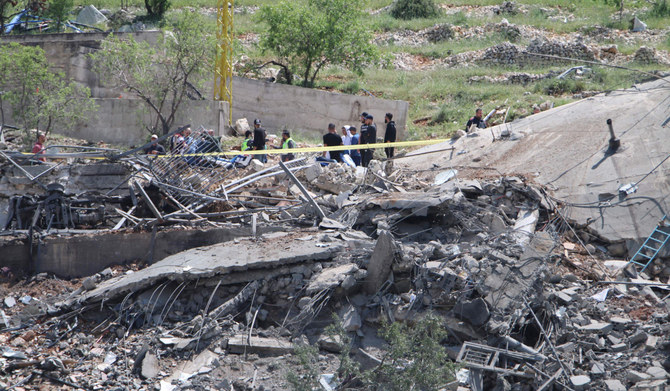BEIRUT: Israeli forces on Sunday struck a Hezbollah site in Lebanon’s east near the Syrian border as tensions soared following Iran’s direct attack on Israel.
Shelling heavily targeted Lebanese border villages and the Bekaa Valley on Saturday night, as the Israeli military carried out raids on Khiam, Kfarkila, and Odaisseh.
Artillery shelling also targeted Houla, Wadi Saluki, the vicinity of Deir Mimas, and areas along the Litani River.
The raid on Khiam resulted in the death of one person, and many civilians were injured in other villages.
BACKGROUND
Hezbollah has exchanged near-daily cross-border fire with Israel since the Palestinian group attacked southern Israel on October 7, triggering war in the Gaza Strip.
A missile exploded near a Lebanese Army intelligence office in the Jdeidet Marjayoun village.
The missile caused significant material damage to the facility and nearby houses, but miraculously, nobody was injured.
On Sunday morning, Israeli warplanes targeted the park in Jabal Safi adjacent to Jbaa and the outskirts of a village in Iqlim Al-Tuffah.
A sonic boom caused by missile fire damaged several houses, shops, and schools in Jbaa, while Israeli planes also targeted areas deep inside central Bekaa, specifically a three-floor building between the Saraain and Nabi Chit villages. Additionally, military aircraft were seen flying over Baalbek and its surroundings.
The Israeli military said that it struck “an important weapon manufacturing site for Hezbollah in Nabi Chit.”
Hezbollah’s own attacks were limited to Israeli military outposts repeatedly targeted since the outbreak of hostilities, including the air and missile defense headquarters at the Kaylaa outpost in the Golan Heights, which Hezbollah targeted with dozens of Katyusha missiles.
Following the Iranian attack on Israel overnight, Hezbollah’s supporters rallied in Beirut’s southern suburbs, holding the party’s banner and chanting slogans in support of Tehran.
News that the majority of the Iranian drones and missiles were intercepted before reaching Israeli airspace, however, prompted criticism of the attack online.
Beirut's Rafic Hariri International Airport closed for six hours after news of the impending attack broke on Saturday evening.
Lebanese people flocked to gas stations to fill their tanks in case escalating tensions affected supplies in the coming days.
The representative of the country’s fuel distributors, Fadi Abu Shaqra, said that “fuel is secured, and the quantities are sufficient for (the next several) days.”
He said gasoline and diesel were available, and there was no need for the public to worry about shortages.
Caretaker Public Works and Transportation Minister Ali Hamia said the airport will gradually return to work as normal.
“Closing the airport was a precautionary measure. It took into account the safety and security of people arriving and departing,” Hamia said.
“At 7 a.m., we suspended the closure decision. The airspace was opened, and work will gradually return to its normal course.”
Middle East Airlines said it had rescheduled a number of flights and announced the successful departure of flights to London and Dubai.

























